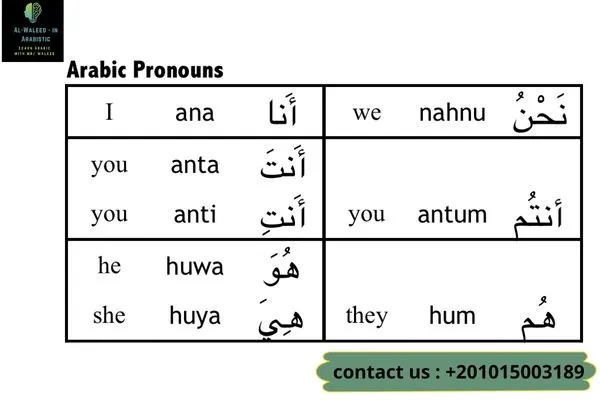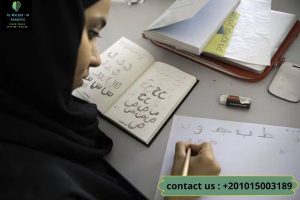Navigating Arabic pronouns can be challenging for American learners, particularly when it comes to detached pronouns. However, the effort to master them unlocks a wealth of expression, enhancing the richness and subtlety of your Arabic communication. Fear not, eager language enthusiasts! This comprehensive guide will help you Master Detached Pronouns in Arabic Language, unraveling their mysteries and transforming you into a confident user of these essential elements in no time.
What are Detached Pronouns in the Arabic language?
The Arabic language offers a special category of pronouns known as detached pronouns in Arabic language, or independent pronouns. Unlike attached pronouns, these stand proudly on their own within a sentence, acting as independent words Unlike their attached counterparts, which are directly attached to nouns or verbs, detached pronouns have their grammatical existence.
Detached pronouns in Arabic language are more than just words; they’re functional tools. These pronouns play a vital role in both grammar and discourse, serving various purposes such as:
- Emphasizing nouns or noun phrases: Detached pronouns can highlight specific elements in a sentence, drawing the listener’s attention to their importance.
- Indicating case: Detached pronouns change their form depending on their grammatical function within a sentence, such as subject, object, or complement.
- Replacing nouns or noun phrases: Detached pronouns can be used to avoid repetition and maintain a smooth flow of conversation.
- Introducing new topics: Detached pronouns can be used to introduce new ideas or subjects in a discourse. There is no doubt that the enclosure and how to use it in the Arabic language requires effort and work, so we hope to give you an opportunity to participate in our ARABIC LANGUAGE COURSE For beginners and those with an advanced level, take the first step to success.
watch the following video:
How Many Detached Pronouns Are in Arabic?
The Arabic language boasts a rich system of detached pronouns, encompassing various forms to cater to different grammatical contexts. In total, there are 18 detached pronouns in the Arabic language, each with distinct variations for gender, number, and case.
Detached pronouns in Arabic language with examples

Arabic’s Detached Pronouns: Your Key to Clear Expression! These versatile tools, like a well-stocked toolbox, empower you to craft clear and impactful communication in Arabic Understanding their different types is crucial for mastering their usage. Here, we delve into the three main categories of detached pronouns within the Arabic language:
Subject Pronouns: The Stars of the Show
Subject pronouns take center stage in a sentence, representing the one performing an action or experiencing a state. Think of them as the main characters driving the plot of your Arabic narrative.
| Pronoun | Meaning |
|---|---|
| أنا (ana) | I (masculine) |
| أنتِ (ʾanti) | You (feminine) |
| هو (huwa) | He |
| هي (hiya) | She |
| نحن (naḥnu) | We |
| أنتم (ʾantum) | You (plural) |
| هم (hum) | They (masculine) |
| هن (hunna) | They (feminine) |
Object Pronouns: The Targets of Action
Object pronouns highlight the recipient of an action or the verb’s direct object. Imagine them as the target or beneficiary within the sentence.
| Pronoun | Meaning |
|---|---|
| إياي (ʾiyāy) | Me |
| إياكِ (ʾiyyāki) | You (feminine, accusative) |
| إياه (ʾiyyāhu) | Him |
| إياها (ʾiyyāhā) | Her |
| إيانا (ʾiyyānā) | Us |
| إياكم (ʾiyyākum) | You (plural, accusative) |
| إياهم (ʾiyyāhum) | Them (masculine, accusative) |
| إياهن (ʾiyyāhunna) | Them (feminine, accusative) |
Possessive Pronouns: Claiming Ownership with Clarity
Possessive pronouns act like possessive adjectives, indicating ownership or possession of something. They stand alone as separate words, offering an alternative to possessive suffixes.
| Pronoun | Meaning |
|---|---|
| مِني (minni) | Of me |
| مِنكِ (minniki) | Of you (feminine) |
| مِنْهُ (minhu) | Of him |
| مِنْها (minhā) | Of her |
| مِنّا (minnā) | Of us |
| مِنْكُم (minkum) | Of you (plural) |
| مِنْهُم (minhum) | Of them (masculine) |
| مِنْهُن (minhunna) | Of them (feminine) |
Embrace the Power of Detached Pronouns in Arabic Language
With these three detached pronouns under your belt, you’ll be crafting nuanced and clear sentences in Arabic in no time Remember, practice makes perfect! So, dive into Arabic conversations and immerse yourself in the language to solidify your understanding of these versatile pronouns.
Usage of Detached Pronouns in Arabic
Detached pronouns in Arabic are commonly used in the following scenarios:
1. As the Subject of a Nominal Sentence: In Arabic, a nominal sentence (جملة اسمية) is a sentence that begins with a noun or pronoun. Detached pronouns are often used at the beginning of these sentences to indicate the subject.
- Example: أنا طالب (Ana talib) – I am a student.
2. For Emphasis: Detached pronouns are also used to emphasize the subject of the sentence, making it clear who or what is being referred to.
- Example: هو الطبيب (Huwa at-tabeeb) – He is the doctor (emphasizing “he”).
3-In the Absence of a Verb: In sentences where no verb is present, detached pronouns are essential for maintaining clarity.
- Example: هي جميلة (Hiya jameela) – She is beautiful.
4-Question Formation: Detached pronouns are used in forming questions, particularly when asking about the subject.
- Example: أنت طالب؟ (Anta talib?) – Are you a student?
The List of Detached Pronouns in Arabic
Here is a complete list of detached pronouns in Arabic, categorized by gender and number:
Singular:
- أنا (ana) – I
- أنت (anta) – You (masculine)
- أنتِ (anti) – You (feminine)
- هو (huwa) – He
- هي (hiya) – She
Dual:
- نحن (nahnu) – We (both male and female)
- أنتما (antuma) – You two (masculine/feminine)
- هما (huma) – They two (masculine/feminine)
Plural:
- نحن (nahnu) – We
- أنتم (antum) – You (masculine)
- أنتنَّ (antunna) – You (feminine)
- هم (hum) – They (masculine)
- هنَّ (hunna) – They (feminine)
Key Points to Remember
- Detached Pronouns Are Independent: Unlike attached pronouns, detached pronouns stand alone and are not connected to other words.
- Used for Emphasis and Clarity: Detached pronouns are often used to emphasize the subject or clarify the subject’s identity in a sentence.
- Crucial in Nominal Sentences: In Arabic, detached pronouns are essential in forming nominal sentences, which are common in the language.
The Concept of Personal Pronoun in Arabic:

In Arabic, pronouns replace nouns, acting as stand-ins for people or things. Detached pronouns are a type of personal pronoun, distinct from their attached counterparts. Unlike attached pronouns which cling to nouns or verbs, detached pronouns stand alone as separate words in the sentence.
Here’s a breakdown of personal pronouns in Arabic:
- S Detached Pronouns (aka Independent Pronouns) act on their own in a sentence, just like the word ‘أنا (ʾanā)’ which means ‘I’.
- Attached Pronouns: Attach directly to nouns or verbs (e.g., كتابكَ (kitābuka) – “your (masculine) book”)
A firm grasp of detached and attached pronouns is essential for navigating conversations and written communication
Read Also: A COMPREHENSIVE GUIDE TO DEMONSTRATIVE PRONOUNS IN THE ARABIC LANGUAGE
What are the Genderless Pronouns in Arabic?
While Arabic lacks a single gender-neutral pronoun like English, the language offers creative solutions for expressing gender neutrality in specific situations.
- Third Person Singular Masculine (He): In spoken Arabic, the masculine singular pronoun “هو” (huwa) can sometimes be used in a gender-neutral way, especially when referring to a person whose gender is unknown. This usage is more common in informal settings.
- Plural Pronouns: Both masculine and feminine plural pronouns (هم (hum) – “they”, هُن (hunna) – “they” (feminine)) can be used in a gender-neutral way when referring to a group of people of unknown gender.
It’s important to note that these are informal strategies, and the appropriate method for expressing gender neutrality in Arabic may vary depending on the context and desired level of formality.
We want to inform you that we at Al Walid Academy The best Arabic academy provide the best quality at the level of neighboring regions, as a quality of education and Dedicated to the learning journeys of all our teachers and students, we’re your educational partner. Don’t hesitate to reach out and embark on your path to success with us
I hope that answers about Detached Pronouns in Arabic Language



